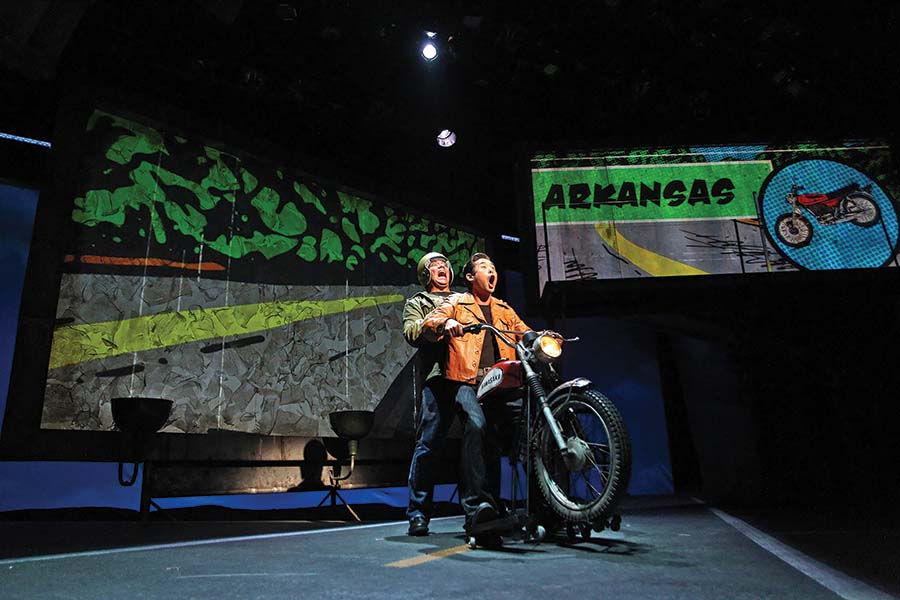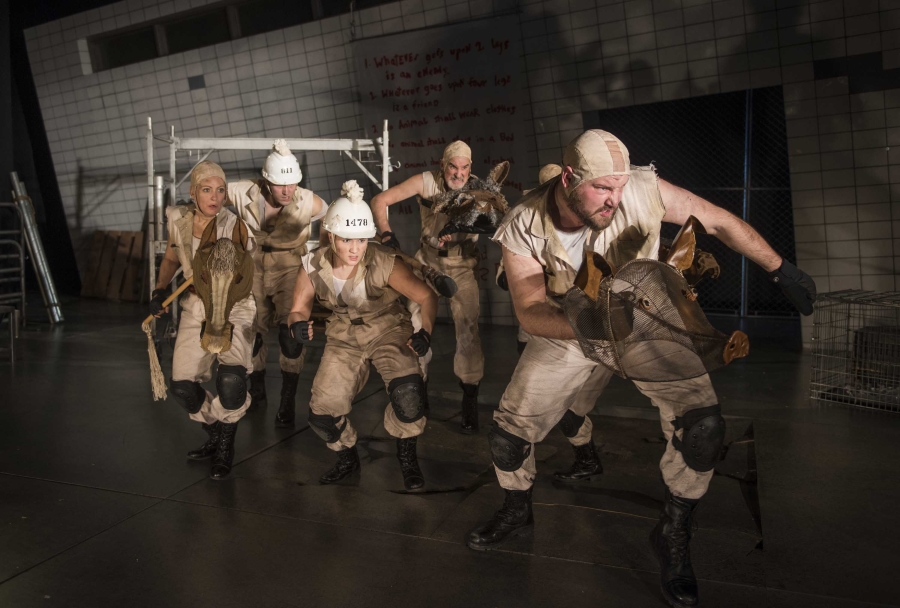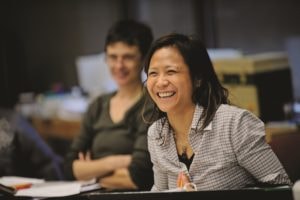May Adrales can pinpoint the one production that has shaped her directing career. It was 2011, and Adrales was directing the world premiere of A. Rey Pamatmat’s Edith Can Shoot Things and Hit Them as part of the Humana Festival of New American Plays at Actors Theatre of Louisville. The project was her first major production with Pamatmat, whom she’s worked with numerous times since, and their partnership clicked.
“It was such a special experience, and I think at that point I knew that was the kind of theatre I really wanted to do. A) I really believed in the play and B) I found my family,” says Adrales, who accepts TCG’s semi-annual Alan Schneider Director Award today. “With every single show I’ve done since then, I’m always trying to find that alchemy and that family again—it makes the work so much better.”
Adrales’s family of repeat collaborators has grown to include playwright Qui Nguyen and the cast and creative teams of Nguyen’s Vietgone. She spearheaded productions of the play at the Manhattan Theatre Club, South Coast Repertory, Oregon Shakespeare Festival, and Seattle Repertory Theatre. Next she’ll helm Nguyen’s Poor Yella Rednecks—part two of the playwright’s Vietgone trilogy—at South Coast Rep (March 30-April 27, 2019).

“We’re creating a real family, and it’s just incredible to be able to create art with your family over and over again,” says Adrales. “And at the same time, completely smash stereotypes about refugees and immigrants and create some kick-ass roles for Asian Americans that are filled with joy and humor and hip-hop.”
Fostering new works, especially ones that retell history through new perspectives, is where her family tree is rooted. Her collaborative career now even has a branch in Milwaukee, where she’s finishing up a season-long role as the company’s associate artistic director.
American Theatre spoke with the director about her far-flung freelance career and the plans for her future.
What has your experience been at Milwaukee Rep learning about the administrative side of the industry?
It is such an amazing opportunity to actually have a seat at the table as they are making season planning choices and be able to understand more about the institutional part of it, and seeing how to manage a large institution that is going through a lot of change. The theatre is also pushing forward to have more adventurous art and making the artistry the center of the organization, as well as pushing its EDI initiatives and trying to make a cultural shift that way. It’s been educational, and alternatively inspirational and daunting to challenge those tasks. It’s hard to initiate change, and it’s hard to start to reframe things differently.
What are the big takeaways from this experience?
I think the thing that I’ve gained, which I didn’t have before this opportunity, is to be able to better understand the responsibility of the institution and see how its rooted in the community—which you don’t necessarily see as a freelancer, because you are just coming in and out. It made me think more deeply about the impact of my work on the community, on the institution, and its affect on staff. What I’ve loved about being able to direct two shows there—two very different shows—is that I’ve gotten to know that community so much more and have a lot more one-on-one conversations. Which is such a luxury, because what I’ve been missing in my freelance career is that connection with the people I’m doing the show for. So that has been really invaluable. I’ve learned a lot from that, and about the role of that theatre plays—and how powerful those connections can be.
Do you think someday you’d like to lead an institution yourself?
I would embrace it. Despite all the political turmoil that is seizing our consciousness every single day, I think that the plus side of it is that people are becoming much more active and interested in dialogue and they’re also interested in investing more in their communities. As people mobilize around different movements, whether it be Black Lives Matter or the #MeToo movement or protesting gun violence, we see these communities come together in a very active way. I think right now is a good time for theatre to actually be the vehicle for communities, for an expression of that and to serve as a platform for the issues that are going on. Now is a time of real engagement, and I think theatre is the only art form that can foster that because people are living and breathing in a room together.

Right now you’re at Oregon Shakespeare Festival directing Idris Goodwin’s The Way the Mountain Moved. Can you talk about how that project came about?
Idris’s play really aligns with the kind of work that I really want to do right now. Its reframing history from a non-white, non-mainstream perspective. He’s taking this time in the 1850s to investigate America’s expansionism. Unlike the genre of the Western—where it is usually a single white male cowboy against the rugged rurals and other forces, and filled with violence—Idris is actually taking a much deeper look at the rest of what that time really was, and essentially what America could have been had we been a society that was not so focused on aggression and takeover through violence. If we had become a country that was more inclusive and believed in a plurality of cultures being able to co-exist together. It is such an unusual, theatrical piece.
How so?
One of the major characters is the land—the land that they are trudging over that’s been their lifeblood. The action in the play is all hinged on a sound that is a mystery in the play. If a writer gives those kind of challenges to a director, your imagination has to implode. And you have to think about how to make this work onstage. How do you translate the genre of the film Western, like the close-up, to theatre? How do you actually create a sound unlike anything that has ever existed before? How do you characterize the land in that it is so expansive and vast? And we’re doing it in the smallest space here at OSF, and the play is also in rep—so whatever we lay down has to be taken out three hours later. I like those challenges. I like it when playwrights leave a playground for directors and designers to play with.
Next up you’ll be directing In the Heights, a co-production with Milwaukee Rep, Seattle Repertory Theatre, and Cincinnati Playhouse in the Park. This seems like a departure from the projects you usually take on.
I’ve directed new musicals, and also chamber musicals, but this will be my first big Broadway-style musical. I was interested in doing the project, and I put my name in the ring and I’m glad that I did. I’m glad I had the confidence in my own skills to be able to do that, because I got the opportunity and it is really exciting. In order to take on this challenge of doing this three-city, what we’re calling a mini-tour, I just had to get the right people to be my partners in it. William Carlos Angulo, a fantastic Chicago-based choreographer, he’s deeply passionate about the play and we’ve had a fantastic time working on it together. Dan Kazemi, who is the music director, he’s done all the musicals under Mark [Clements’] tenure at Milwaukee Rep. And I’ve been able to work with a fantastic design team that can really think forward about how it is going to be in different spaces.
The musical is so good, and it was one of the first musicals I saw when I moved to New York. I saw it at 37 Arts and then I saw it on Broadway. I remember leaning on the edge of my seat thinking, it’s so incredible to see this story come alive. And I feel like it hasn’t lost its relevance, especially since it deals with gentrification and also what is going on politically—in terms of the most vulnerable groups being pinpointed in so many political policies. Its great to celebrate their resilience and also be part of this musical that is doing a revolutionary act—people are staking claim of a corner of this America and making their home here. I think that is a story we need right now.
Because you’ve been in Milwaukee this year, you haven’t been teaching. Will you return to the classroom?
Mentorship is really important to me. I have some students and clients that I help coach independently, with career pitches. I’m trying to take up the mantle of being more of a giver and a mentor in my professional life. I’m trying to give responsibilities to my a.d.s to help bring them up. As I was coming of age, I learned so much in those opportunities. But I never assisted a woman director, and I never assisted a director of color either. I’m starting to realize how empowering that can be if an assistant director can look to that leadership. I don’t know that I would go into an institution to teach again, but I feel that I’m best serving the industry and the next generation by trying to create learning opportunities for others in my professional life.


